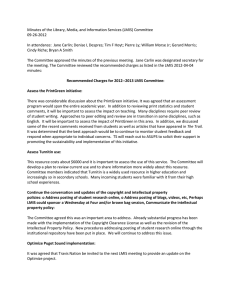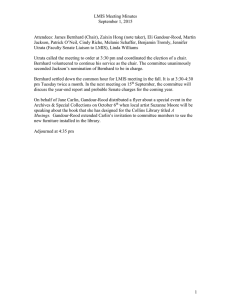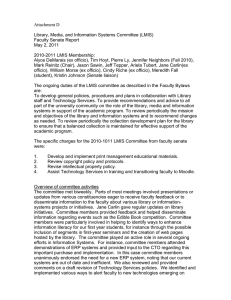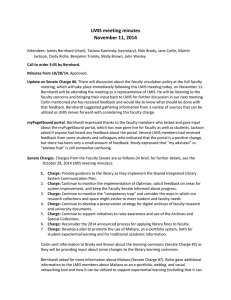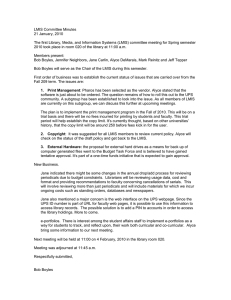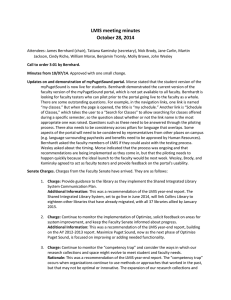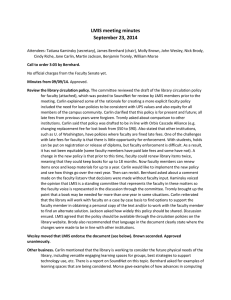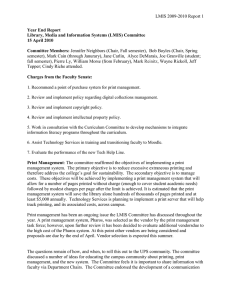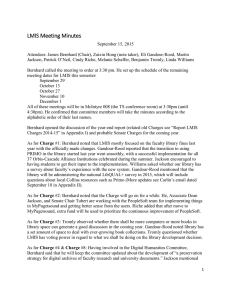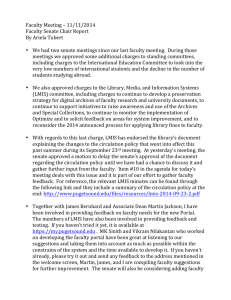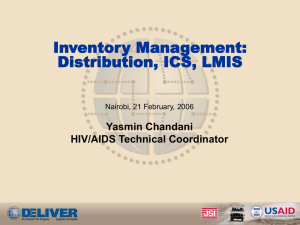To: Faculty Senate From: James Bernhard, Chairperson LMIS
advertisement
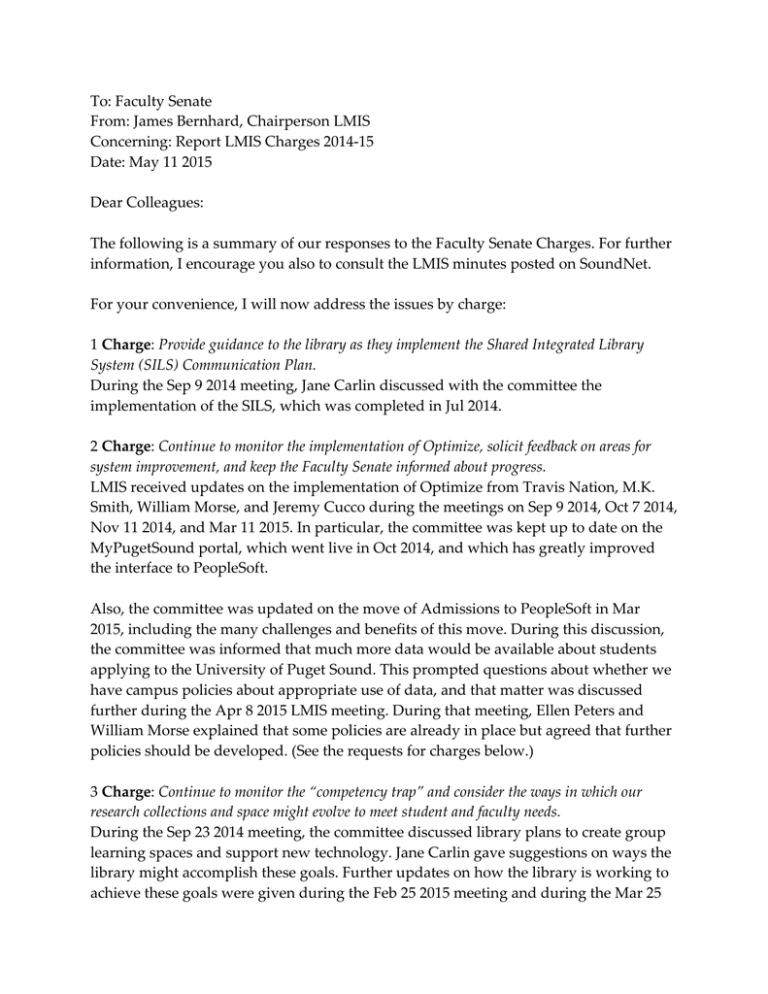
To: Faculty Senate From: James Bernhard, Chairperson LMIS Concerning: Report LMIS Charges 2014-­‐‑15 Date: May 11 2015 Dear Colleagues: The following is a summary of our responses to the Faculty Senate Charges. For further information, I encourage you also to consult the LMIS minutes posted on SoundNet. For your convenience, I will now address the issues by charge: 1 Charge: Provide guidance to the library as they implement the Shared Integrated Library System (SILS) Communication Plan. During the Sep 9 2014 meeting, Jane Carlin discussed with the committee the implementation of the SILS, which was completed in Jul 2014. 2 Charge: Continue to monitor the implementation of Optimize, solicit feedback on areas for system improvement, and keep the Faculty Senate informed about progress. LMIS received updates on the implementation of Optimize from Travis Nation, M.K. Smith, William Morse, and Jeremy Cucco during the meetings on Sep 9 2014, Oct 7 2014, Nov 11 2014, and Mar 11 2015. In particular, the committee was kept up to date on the MyPugetSound portal, which went live in Oct 2014, and which has greatly improved the interface to PeopleSoft. Also, the committee was updated on the move of Admissions to PeopleSoft in Mar 2015, including the many challenges and benefits of this move. During this discussion, the committee was informed that much more data would be available about students applying to the University of Puget Sound. This prompted questions about whether we have campus policies about appropriate use of data, and that matter was discussed further during the Apr 8 2015 LMIS meeting. During that meeting, Ellen Peters and William Morse explained that some policies are already in place but agreed that further policies should be developed. (See the requests for charges below.) 3 Charge: Continue to monitor the “competency trap” and consider the ways in which our research collections and space might evolve to meet student and faculty needs. During the Sep 23 2014 meeting, the committee discussed library plans to create group learning spaces and support new technology. Jane Carlin gave suggestions on ways the library might accomplish these goals. Further updates on how the library is working to achieve these goals were given during the Feb 25 2015 meeting and during the Mar 25 2015 meeting, in which Jane Carlin gave a detailed presentation of library renovations that are being planned, and the committee then discussed these planned renovations. 4 Charge: Continue to develop a preservation strategy for digital archives of faculty research and university documents. The committee did not discuss this charge separately but only in the context of Charge #3. 5 Charge: Continue to support initiatives to raise awareness and use of the Archives and Special Collections. The committee did not discuss this charge. 6 Charge: Reconsider the 2014 announced process for applying library fines to faculty. This charge was our single largest item of business for the year. Because the library fines policy affects faculty so directly and because there is a wide range of views on how fines should be applied, this issue went beyond just the LMIS committee. The committee itseslf discussed the issue during the meetings on Sep 9 2014, Sep 23 2014, Nov 11 2014, Dec 2 2014, Jan 30 2015, and Feb 25, 2015. As a representative of LMIS, James Bernhard attended the faculty meeting on Nov 11 2014, in which library fines were discussed. Taking into consideration the discussions within the committee and among the full faculty, Jane Carlin proposed and the committee accepted (on Jan 30 2015) a revision of the library fines policies that includes: a longer loan period, maintaining the proposed billing process without the penalty of late fees (except on ILL/Summit materials), and a provision that emphasizes that Library circulation staff will work closely with individual faculty members to accommodate research needs and exercise flexibility. 7 Charge: Develop a plan to promote the use of Mahara, an e-­‐‑portfolio system, both for student experiential learning and for traditional academic information. During the Nov 11 2014 meeting, the committee discussed how Mahara might be used more widely on campus. Various suggestions were made, such as: adding Mahara to the myPugetSound portal, having advisors increase awareness of the tool, and getting Career & Employment Services involved in promoting Mahara’s use. No concrete plan for increasing Mahara use was developed, however. 8 Charge: Discuss ways in which LMIS can support collaborative activities on campus such as NW5 digital humanities projects. The committee did not discuss this charge. Because Charge #6 turned out to require much discussion and work on the part of LMIS, the committee did not get to Charges #4, #5, and #8 this year. These seemed like good charges for the committee to have, but they were lower priority than Charge #6. Requests for future charges: Based on the committee’s discussions of data use in the context of Charge #3, the committee would like to work with IR and TS next year to develop policies to guide and/or govern the appropriate use of data on campus. Committee size and workload: The committee seemed to have a suitable number of members for its workload. LMIS needs enough members to fuel discussions, but it does not have a lot of regular subcommittee work that needs to be divided among its members, so more members are not needed. None of our workload seemed superfluous, and as detailed above, we had more (but not too much more) business than we could attend to during the year.
